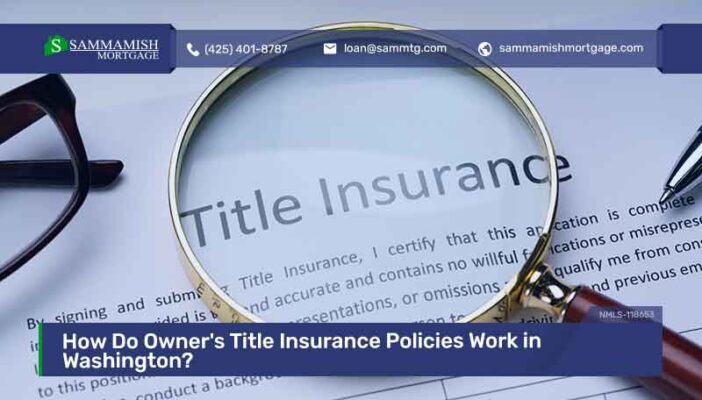No Obligation and transparency 24/7. Instantly compare live rates and costs from our network of lenders across the country. Real-time accurate rates and closing costs for a variety of loan programs custom to your specific situation.

We’ve covered the concept of title insurance in the past, from a who-pays-what perspective. But home buyers in Washington tend to have a lot of questions about this subject. So today, we will drill down and focus on the owner’s title insurance policy, in particular.
Here’s what home buyers in Washington should know about owner’s title insurance policies and the important protections they provide.
An owner’s title insurance policy is a type of insurance that protects a home buyer from what are known as “title defects.” A title defect is any issue that could affect the buyer’s ownership of the property, such as a lien, mortgage, or easement.
When you buy a home in the state of Washington, you’re also buying the legal right to own the property. This right is documented in a deed, a legal document that transfers ownership from the seller to the buyer.
But even if the deed is in order, there may be other title defects that are not revealed by a simple title search. An owner’s title insurance policy protects you from financial losses you might incur as a result of such defects.
For example, if someone comes forward after you buy the property and claims that they own it, the title insurance company would pay some or all of the costs required to resolve the problem.
In the state of Washington, title insurance is a one-time cost that’s typically paid at closing. The cost of the policy will vary depending on the property’s value and the type of title insurance that you purchase. The policy will protect you for as long as you own or have an interest in the home.
Just like any other type of insurance, your coverage can vary depending on the type of policy you purchase and the clauses it contains. But in most cases, owner’s title insurance in Washington will cover some or all of the following issues:
An owner’s title insurance policy is optional in most states, including Washington. But it’s definitely worth considering when buying a house.
Mortgage lenders often require borrowers to purchase a lender’s title insurance policy, which protects the lender’s interest in the property. But they usually don’t require borrowers to purchase an owner’s title insurance policy.
There are a few reasons why you might want to consider purchasing an owner’s title insurance policy. You can enjoy peace of mind from knowing you’re protected from title defects. It could also save you money in the long run, in the event of a legal dispute.
The main difference has to do with who they protect. Owner’s title insurance protects the buyer of a property from title defects, as explained earlier. Lender’s title insurance, on the other hand, protects the lender that loans money for the purchase of the property.
Mortgage lenders often require borrowers to purchase a lender’s title insurance policy, since the lender has a large financial stake in the property. But the owner’s policy is optional. The main point here is that they are two different policies that offer different kinds of protection.
In Washington state, the seller typically pays for the owner’s title insurance policy. However, the buyer and seller can negotiate who will pay for the policy. Like many aspects of a real estate transaction, this is fully negotiable.
According to the Washington State Insurance Commissioner’s Office:
“To protect your interest, you can choose to buy an owner’s title policy for the full price you paid for the property. Generally, most sellers pay for the owner’s policy.”
The cost of owner’s title insurance in Washington can vary depending on the property’s value and other factors. But it usually falls somewhere between 0.5% and 1% of the property’s value. It’s a one-time cost paid at closing.
For example, if you buy a home in Washington for $500,000, you might pay somewhere between $2,500 and $5,000 for owner’s title insurance.
The type of policy you purchase can also affect the cost. There are two main types of title insurance policies: standard and extended. A standard policy protects you from the most common types of title defects, while an extended policy covers rare defects as well. Extended policies typically cost more because they offer broader protection.
The short answer is: it depends.
Boundary disputes are a type of title defect, but they’re not always covered by owner’s title insurance. If this is a specific concern for you, you’ll want to read through the policy to see if it’s included and what type of protection is offered.
You might even need to purchase an extended policy to have it include property line disputes. Extended policies usually cover boundary disputes caused by errors in the survey or by fraud.
But again, all of this can vary from one insurer to the next. So be sure to ask plenty of questions and read all of the fine print.
Note: This article explains the basic concepts relating to owner’s title insurance policies in the state of Washington. It is intended for a general audience, so portions of this article might not apply to your situation. Your insurance provider will be able to answer any questions you have about coverage specifics.
Whether you’re buying a home or ready to refinance, our professionals can help.
{hours_open} - {hours_closed} Pacific
No Obligation and transparency 24/7. Instantly compare live rates and costs from our network of lenders across the country. Real-time accurate rates and closing costs for a variety of loan programs custom to your specific situation.